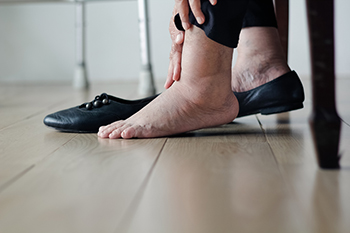
Many older adults experience some degree of swelling in the feet, ankles, and lower legs. This can cause a senior to become less certain on their feet, thereby increasing the risk of falling, and this may lead to a more sedentary lifestyle. Swelling, or edema, in seniors is frequently the result of retention of fluid in the lower extremities. It can be caused by underlying conditions, such as congestive heart failure or other heart-related problems, chronic kidney disease, rheumatoid arthritis, and vascular problems. A number of simple lifestyle changes can help to reduce edema. Among them are wearing compression socks or stockings, avoiding shoes that are too tight, and keeping the legs elevated as often as possible. Moving the feet, toes, and ankles is important, as sitting or standing in one place for too long can increase swelling. Performing simple ankle rotations or flexes can be beneficial. Eating foods rich in magnesium, such as legumes, fresh vegetables and leafy greens, and whole grains, may also help. If swelling in the feet becomes a chronic problem, it is suggested that you consult a podiatrist for an exam and diagnosis.
Swollen feet can be a sign of an underlying condition. If you have any concerns, contact Deann Hofer Ogilvie, DPM of Ascend Foot & Ankle Center. Our practitioner can provide the care you need to keep you pain-free and on your feet.
Swollen feet are a common ailment among pregnant women and people who stand or sit for extended periods. Aging may increase the possibility of swollen feet and patients who are obese often notice when their feet are swelling too. There may be medical reasons why swollen feet occur:
- Phlebitis - A condition that causes the veins to become inflamed and can also cause leg pain.
- Liver disease - This may lead to low blood levels of albumin which is a protein. This can cause fluid in the blood to pass into the tissues and several areas of the body can become swollen.
- Heart failure - When the heart doesn’t pump properly the blood that is normally pumped back to the heart can pool in the veins of the legs causing swollen feet.
- Kidney disease - One of the main functions of the kidneys is releasing excess fluid in the body. This type of condition can make it difficult for the kidneys to function properly, and as a result the feet may become swollen.
- Deep-vein thrombosis (DVT)- This is a serious condition where blood clots form in the veins of the legs. They can block the return of blood from the legs to the heart which may cause the feet to swell. It is important to be treated by a podiatrist if this condition is present.
Swollen feet can also be caused by bone and tendon conditions, including fractures, arthritis, and tendinitis. Additionally, there may be skin and toenail conditions and an infection may cause the feet to swell. Patients who take medicine to treat high blood pressure may be prone to getting swollen feet.
Many patients elevate their feet to help relieve the swelling and this is generally a temporary remedy. When a podiatrist is consulted the reason behind the swelling can be uncovered and subsequently treated.
If you have any questions please feel free to contact our office located in Lafayette, CO . We offer the newest diagnostic tools and technology to treat your foot and ankle needs.
